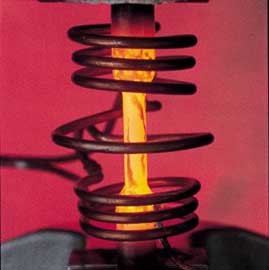新しいよりよい素材のために

材料テストでは、材料の構造と特性の関係が研究されます。
この研究は、品質、安全性、信頼性といった重要な要素を評価することが多く、より優れた新素材を製造するために利用されます。
材料テストの一般的な用途や産業には、マイクロエレクトロニクス、鉱業、自動車、航空宇宙、ナノテクノロジー、故障解析、法医学工学などがあります。
この分野では、生体材料、ナノ材料、ポリマー、薄膜、セラミックなどが、注目される分野です。
高周波誘導加熱(IH)活用による利点
誘導加熱を使った加熱は、信頼性、再現性に優れ、非接触でエネルギー効率の高い加熱を短時間に行います。
材料テストにおいては、加熱はよく制御され正確な方法で適用される必要があります。
先進のソリッドステート技術による誘導加熱電源を活用した高周波誘導加熱装置は、幅広いレンジのスピードと温度を提供し、温度上昇やパターンを制御するための入力デバイスにも対応します。
熱電対が温度測定によく使用され、温度コントローラとともに電源を直接コントロールすることが可能です。
この誘導加熱装置は、長期間または長期サイクルのテストに適しています。
テストサンプルの全体をむら無く加熱するための加熱コイル設計のノウハウもあります。
材料テストに適した高周波電源の出力レンジは、材料やアプリケーションによりますが、おおよそ1から20kWです。
材料テストの例
引張試験
どれだけ応力がかかり歪むかを調べる
張力を亀裂や変形が起きるまで長軸方向に引張負荷を上げていく
圧縮試験
どれだけ圧縮され縮むかを調べる
引張試験と似ているが、力を圧縮する方向に縮むまでかける
ねじり試験
亀裂が入るまでどれだけねじれるかを調べる
回転する力を長辺方向にかける。ドライブシャフトなど回転軸の材料テストで実施される
